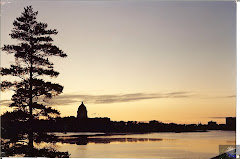Says she feels that in giving interviews with mainstream media “you set yourself up to just continually be mocked”
By Jonquil Frankham
Monday, October 20, 2008 (LifeSiteNews.com) - Vice-Presidential candidate Sarah Palin was interviewed this weekend by CBNews correspondent David Brody, answering a variety of questions on matters ranging from her Christian faith to her position on a federal constitutional marriage amendment that would define marriage as being between one man and one woman.
When questioned about the shots the mainstream media has been taking at her for her religious beliefs, Palin told Brody that her faith has “always been pretty personal and that was kind of a surprise in the last couple of months that people would misconstrue and spin anything that has to do with my faith or anybody else's and turn it into something to be mocked. That's very sad.”
“I don't think that there's anything that I can do about it,” the Alaskan senator admitted, adding “no matter what anybody says about it, I'm going to keep plugging away at this and I'm going to keep seeking God's guidance and His wisdom and His favor and His grace - for me, for my family, for this campaign, for our nation.”
Asked why she does not do interviews with the mainstream cable networks, Palin commented on the media “opaqueness” that “filters” and “contorts … a person’s words and intentions,” which “does more harm than good.” She says that this makes her campaign with presidential candidate John McCain more of a challenge, forcing them to travel “hard and fast and aggressively across the US to reach more people.” Palin said she feels that in giving interviews with mainstream media “you set yourself up to just continually be mocked.”
The governor, however, remains unapologetic about her faith. Saying she is concerned about the possible negative effects on her family of the various “political shots” they have been suffering in recent months, Palin asked for prayers for her family, as well as for “God’s hand of protection [to be] … continually over our land – His wisdom, His grace, His favour.” She also discussed her baptism, which occurred in her early teens: “I knew that there was something certainly bigger than I out there.”
”I knew that I wouldn't be able to handle all that was laid out in front of me in life if I did not have strong faith in my Creator,” said Palin.
Saying she “hadn’t really worn it [faith] on her sleeve,” Palin told Brody that it was more important to live faith rather than preach it: “As you're raised up out of the water it's like ‘hey world, this is my confession of faith that I'm going to try to lead, and live my life according to my belief that God as my Creator has good plans for all of us.’”
Palin demonstrated that she was equally unabashed about her ethical stances on controversial issues such as abortion and same-sex “marriage.” She told Brody she voted “along with the vast majority of Alaskans” to amend the Constitution, “defining marriage as between one man and one woman.” She hopes to take this initiative to the federal level as well, stating plainly, “I don’t support gay marriage.”
Palin also said that senator Barack Obama’s stance on abortion is “extreme – … it’s so, so far left that it’s way out of the mainstream.” She referred specifically to his opposition to the Born Alive Infants Protection Act (which would provide legal protection to babies who had survived abortions), to parental consent for out-of-state under-age abortions, and a ban on partial birth abortions. His position, she asserts, is “appalling,” and “should be of concern to voters.”
To see the interview go to:
http://www.cbn.com/CBNnews/466923.aspx ;


